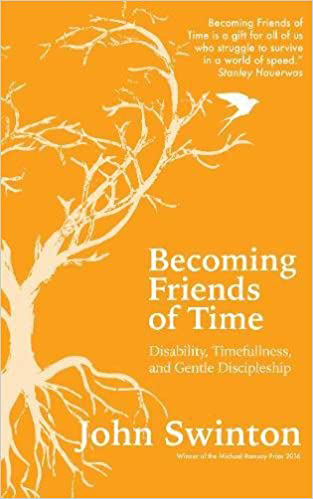
Becoming Friends of Time
By John Swinton
Reviewed by Martin Hobgen
 This book proposes a practical theology of time, for individuals and communities of faith, with particular attention to those who live with the experience of 'forms of disability that emerge from some kind of damage the brain'.1 Swinton argues that instead of focussing on clock time2 we can helpfully shift our focus to what he calls God’s time, which 'is holistic, all embracing, mysterious and ever present'.3
This book proposes a practical theology of time, for individuals and communities of faith, with particular attention to those who live with the experience of 'forms of disability that emerge from some kind of damage the brain'.1 Swinton argues that instead of focussing on clock time2 we can helpfully shift our focus to what he calls God’s time, which 'is holistic, all embracing, mysterious and ever present'.3
Opening with a critique of the nature of clock time Swinton examines how this has shaped societies attitudes towards both the euthanasia of people with dementia, and pre-natal testing for the likelihood of impairments with subsequent abortion. He shows that, in contrast to the exclusion fostered by clock time, the concept of God’s time enables relationships with disabled people to be continued or re-established. The discussion about what this means for people with dementia, brain injury and how non-disabled people relate to them helpfully draws on the experiences of disabled people. These show the importance of slowing down, showing love and paying attention to those who are overlooked in the haste engendered by clock time.
There is a significant challenge presented for the way that churches relate to disabled people, particularly those with significant learning disabilities or injuries. It is too easy for the church to see such people as objects of care and for inclusion to be limited to enabling their presence. Swinton argues, persuasively, that rather than inclusion the focus should be on discipleship. This shapes not only how churches perceive people with significant disabilities but how they are enabled to participate in the life of the church.
Swinton’s re-conception of memory has particular significance for pastoral ministry to individuals and families who are experiencing the dramatic changes brought by dementia, Parkinson’s or brain injury. This underpins the continuity of persons despite the outward discontinuity suggested by changes in personality and character.
Although the focus of the book is on people with some form of damage to the brain, it has important applications to those who become physically disabled through accident or illness. Whereas clock time emphasises a discontinuity between the ‘before’ and ‘after’ the acquisition of a disability, God’s time enables us to find continuities which can help us to realise that our identity was and remains in Christ, rather than our ability or inability.
This book provides a refreshing and challenging way of relating to a diverse range of people who are often on the edges of church and society. I do however have one minor disagreement with Swinton’s suggestion that the relationship between us and God is not mutual in any sense. Following Paul Fiddes’ proposal of a relational trinity set out in Participating in God4 it can be argued that God allows for a significantly greater level of mutuality between and participation with God than Swinton countenances.5
This review was previously published in the Baptist Ministers’ Journal, July 2021 issue: vol. 351
Details:
Author: Swinton, John
Title: Becoming Friends of Time: Disability, Timefullness, and Gentle Discipleship
Publisher: London: SCM Press, (2017)
1 John Swinton,
Becoming Friends of Time: Disability, Timefullness, and Gentle Discipleship (London: SCM Press, 2017), 15.
2 The characteristics of clock time are described as linear, dynamic, forward facing, measurable and controllable. ibid., 22.
3 Ibid., 11.
4 Paul S. Fiddes,
Participating in God: A Pastoral Doctrine of the Trinity (Westminster John Knox Press, 2000).
5 Swinton, 101f.